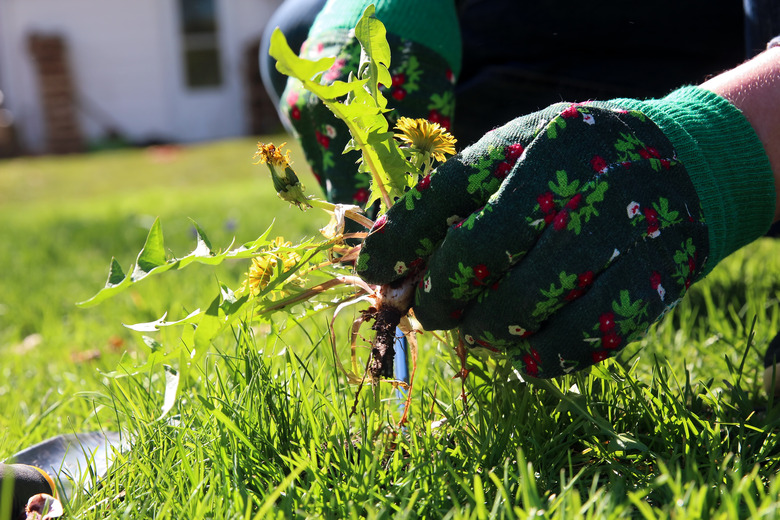Ratio Of Vinegar And Salt Used To Kill Weeds
We may receive a commission on purchases made from links.
Using salt and vinegar as a weed killer tends to be a case of "be careful what you ask for" because they're not just good weed killers — they're good plant killers. In a way, they're not even very good at doing that since they don't kill the roots. Without killing the roots, weeds eventually regrow, which is why this internet-popular natural weed remedy has left the experts skeptical.
How Salt Works on Weeds
How Salt Works on Weeds
If you're a plant watcher around the house, you'll notice that your plants tell you when they need water. They droop and slouch. Salt is a great killer because it sucks water out of the plants and speeds up that whole dehydration routine, resulting in those lifeless, dead weeds you're after.
While the salt's the killer, people commonly add vinegar and soap to lower the salted water's surface tension, enabling the salted water to penetrate deep into the plant. Some folks figure that since the salt's the killer, why not just dump it on the weeds directly? However, it's critical that salt be diluted in water because salt crystals applied directly to your garden are concentrated and will kill not just that growth but the vegetation around it too. Also, whether diluted or not, the salt ions will remain, affecting the soil well into the future. As for vinegar, learn how it works in gardens.
Salt and Vinegar
Salt and Vinegar
Because they're so dangerous to other plants, it's best to use salt and vinegar in places like walkways where weeds grow between bricks or pavers — basically, anywhere not adjacent to or within a prime growing area.
A concentrated pour is generally a good way to go, or you can use a spray bottle with a focused stream rather than a diffused wide spray so the weed killer goes where you want it and nowhere else.
If you're using it on, say, a rock wall with a moss problem or a meandering walkway with grass sprouting up, then it might do the trick for you. Still, many experts aren't a fan of this natural weed-killing solution, so expect your mileage to vary.
Using Salt to Kill Weeds
Using Salt to Kill Weeds
Water-diluted salt will do a good job on its own with weeds if you don't have vinegar around. Start with a ratio of 3 parts water to 1 part salt — table salt will do — mixing until combined. Apply this carefully to the weed-prone area.
The trouble is that sodium is a mineral, and the sodium ion won't vanish, so it can be a problem for anything you plant there down the line; hence, it's why you want to be careful using salt.
For areas in which you'll plant again, simply mix a liter of vinegar with a teaspoon of liquid dish detergent. Spray as needed on weeded areas, as there's no fear of it leaving a toxic residue above or below ground. Just don't expect it to be as effective as you hope because household vinegar just doesn't cut it.
Salt, Vinegar and Soap Mixture
Salt, Vinegar and Soap Mixture
The University of Maryland Extension's studies on vinegar being an effective weed killer were done with a 20-percent-acidity horticultural vinegar, which can be dangerous since it's toxic and can burn skin let alone plants. Stick to the usual 5 percent acidity in household vinegar. The same goes for salt — normal, cheap table salt is all you need. The brand doesn't matter for liquid dish soap either, as you only need a few drops.
To 1 gallon of white, 5-percent-acidity vinegar, add 2 cups of salt and 1 teaspoon of soap. Stir or shake until all the salt dissolves. Apply it to your weeded area with care. It may take several applications to get down into the root and kill the plant entirely.
Others recommend a weaker solution of 1 gallon of vinegar, 1 cup of salt and 1 tablespoon of dish detergent. Combine them and use them in the same fashion. Either concoction will keep indefinitely once mixed.
